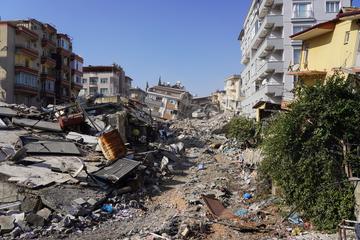
Credit: Pernandi Imanuddin – stock.adobe.com
Researchers from the University of Oxford’s Centre for the study of Social Cohesion (CSSC), investigated social cohesion amongst Turkish citizens and Syrian refugees following the catastrophic earthquakes in February 2023. The study, published in Nature Scientific Reports, shows that shared experiences of a traumatic event like a natural disaster foster group bonding and make survivors more willing to offer assistance to other disaster victims. Remarkably, participants in the study were as likely to help strangers as they were members of their own families.
Previous research at the CSSC suggests that the perception of shared emotion associated with lifechanging events – from painful initiation rituals to experiences of childbirth – can lead to a powerful form of social bonding known as ‘identity fusion’. Identify fusion, characterised by a strong sense of oneness with the group, in turn motivates strong forms of pro-group action. Researchers from the CSSC, University of Connecticut and California State University, Northridge, tested this model among Turkish citizens and Syrian refugees following the earthquakes in Turkey on 6 February 2023. The two major earthquakes measuring 7.7 and 7.6 on the Richter scale struck Turkey near the Southern border with Syria killing more than 50,000 people and displacing more than 5 million. The lead researcher, Sevgi Demiroglu, administered surveys in person to 120 Turkish earthquake survivors in the most heavily affected areas.
In line with expectations, the results showed that identity fusion increased with perceived levels of shared suffering and this in turn predicted pro-group action, expressed as willingness to help other victims. Surprisingly, participants were as willing to help other Turkish earthquake survivors as they were their own families.
The findings of the study contribute to a growing understanding of how shared suffering facilitates group bonding and cooperation, both within and across social groups. Despite longstanding tensions between Turkey and Syria, Turkish earthquake survivors who were traumatised by their experiences felt a connection to the Syrian survivors who had also suffered, increasing fusion with those on the other side of the border and willingness to offer their time to help.
Senior author on the paper and director of the CSSC, Harvey Whitehouse, said: “For many years we have been studying how shared suffering in intergroup violence leads to identity fusion, motivating extreme forms of pro-group action, such as willingness to fight and die to protect the group. But this latest study forms part of a new body of research demonstrating the power of fusion through shared suffering to transcend group divisions and motivate peaceful forms of cooperation. This has far-reaching implications for efforts to manage environmental catastrophes and other global challenges.”
https://player.vimeo.com/video/1064042928?badge=0&autopause=0&player_id=0&app_id=58479